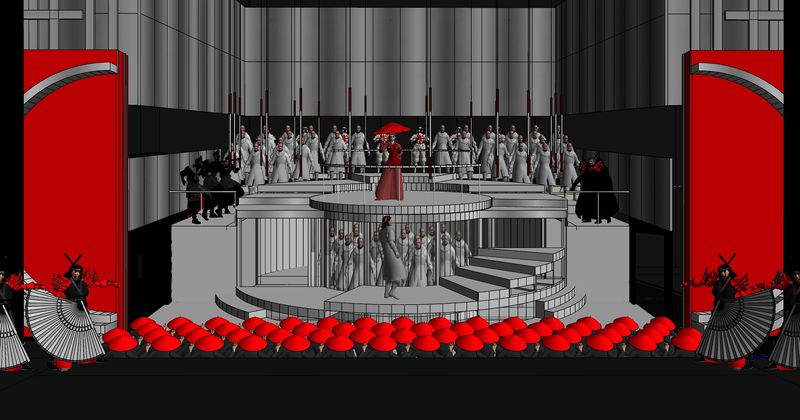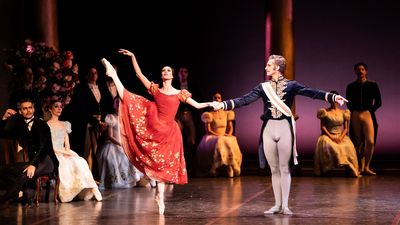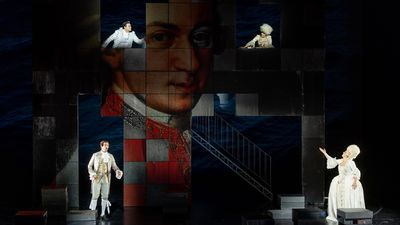
On 9 November 2024, the Hungarian State Opera presents a new production of Turandot staged by Dóra Barta with a cast featuring Eszter Sümegi and Szilvia Rálik in the title role, Boldizsár László and Yusif Eyvazov as Calàf, and returning to the stage after a hiatus of ten years is Dénes Gulyás as the Emperor. Conducted by Péter Halász, the monumental production fusing tradition and modernity is performed with Luciano Berio's 2022 ending beside Franco Alfano's usual version on alternate nights.
The final and unfinished opera of Giacomo Puccini, who died 100 years ago, in 1924, has, like the title character, been a puzzle for creative artists and viewers alike for almost a century. In the mythical story, Princess Turandot sends her suitors to their deaths when they cannot answer her three riddlesto avenge her disgraced ancestor. She is finally beaten by an unknown prince, who, seeing Turandot's desperation, offers a deal: if the icy beauty guesses his name by dawn, he will forfeit his own life. Turandot turns the town upside down, and soon the prince's exiled father and Liù, his slave girl are captured. To spare Timur from torture, Liù claims that she alone knows the prince's name and commits suicide. Puccini had completed the composition and orchestration of his final opera to this point. Many people assume that the composer did not find a right solution how can love prevail convincingly between these protagonists after such events.
Franco Alfano (1875–1954) finished the opera at the request of the family and the publisher, and it has been performed in opera houses around the world since its premiere in Milan in 1926, but the grandiose closing has been felt by many to be fake and discredited ever since. This is how Luciano Berio's (1925–2003) ending in 2002 was conceived in collaboration with the publisher, which concludes the work in 20th-century musical language, evoking Tristan und Isolde, which had a great influence on Puccini, and conveying the doubts raised in the opera.
The two different endings of the opera full of riddles is in focus of the new staging by Dóra Barta. The choreographer-director, whose previous works with the Hungarian State Opera included Les Enfants Terribles and Dido and Aeneas at the Eiffel Art Studios, is now presenting her first production on the stage of the Budapest Opera House. In her approach, the story of Turandot and Calàf focuses on the political intrigues and the survival of ruling dynasties, where the princess is only a tool for imperial interests, and where love or even the experience of one's own independence can be interpreted in a different way. The visuals (designer: Ildi Tihanyi) are inspired simultaneously by elements of Oriental fairy tales and contemporary Asian fashion.
At the 9 November premiere and 12, 17, 19, 23, and 29 November performances (the latter coinciding with the 100th anniversary of Puccini's death) the cast headed by Eszter Sümegi in her debut in the title role also features Boldizsár László as Calàf and Polina Pasztircsák as Liù in Berio's version. On 13, 21, 24, and 27 November Szilvia Rálik, Yusif Eivazov, and Kriszta Kinga will appear on stage in their respective roles with Alfano's conclusion. Further cast includes Dénes Gulyás (Emperor Altoum), Péter Fried (Timur), Attila Erdős (Ping), Tibor Szappanos (Pang), Botond Pál / Tivadar Kiss (Pong), and András Palerdi (Mandarin). The Hungarian State Opera Orchestra and Chorus (chorus director: Gábor Csiki) are conducted by principal guest conductor Péter Halász.
Accompanying the premiere an exhibition entitled Puccini and the Hungarians will open in the Red Parlour of the Opera House in November 2024. The display curated by Márton Karczag, head of the Hungarian State Opera Archives introduces the history of Puccini's stay in Hungary and his other Hungarian connections. For the first time, a special Manon Lescaut score dedicated to legendary Hungarian soprano Rózsi Walter (1899–1974) by the composer himself, which was recently purchased by the Hungarian State Opera, will also be on display.


